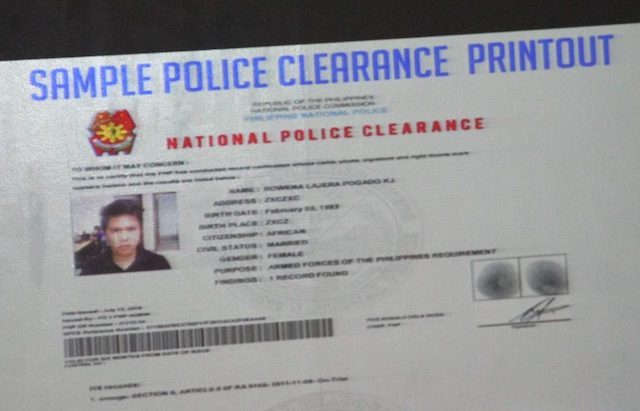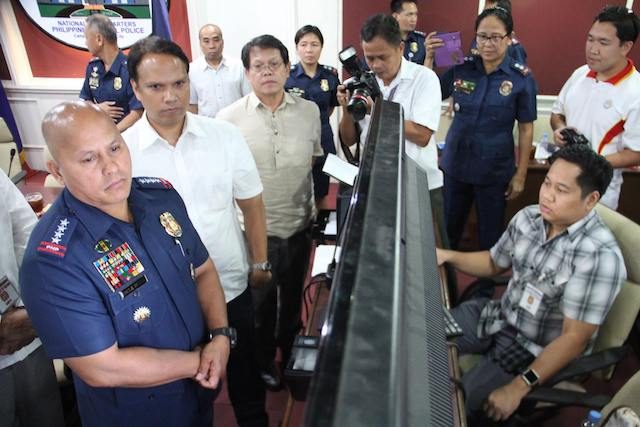SUMMARY
This is AI generated summarization, which may have errors. For context, always refer to the full article.

MANILA, Philippines – Having trouble with getting your clearance from the National Bureau of Investigation (NBI)? The Philippine National Police (PNP) wants to fix that.
The PNP is currently developing a national police clearance system that would rival the database of the NBI, and according to PNP spokesman Senior Superintendent Bernard Banac, they may also be able to replace the procedure of their colleagues all together.
“We are trying to develop now the police clearance system such that we need not anymore get an NBI clearance, but instead, we have to build our own police clearance system that will be reliable, accurate, so that the people don’t go back and forth for processes,” Banac told Rappler in an interview.
Banac’s statement strikes a chord among many Filipinos, as company and government agency requirements vary with regard to the need for either a police or an NBI clearance when applying for a job or obtaining a government document.
This shift, however, is easier said than done, as the transition involves equipment, people, and laws.
The difference in information gathered
Essentially, both are documents that Filipinos present to prove that their names are “cleared” of crimes and derogatory information. The difference lies in the information that the agency keeps, and the information that is gathered during the application.
By law, the NBI’s database is supposed to keep the following information:
- Derogatory and criminal records
- Facial photo
- Fingerprint scan
- Civilian identification records, including identifying marks and characteristics
- Dental records
The dental records are obtained by the NBI with the help of the Philippine Dental Association. All dentists are also mandated by Presidential Decree 1575 to turn over dental records of patients who have no new dental records after 10 years.
The PNP, meanwhile, is supposed to have the following information about citizens in their database:
- Derogatory and criminal records
- Blotter records
- Facial photo
- Fingerprint scan
The NBI has more official records, but the PNP also gets details through their reference to their blotter books – which records even unconfirmed derogatory information and trivia such as a person having figured in a car accident.
Database scope
So far, the NBI casts a wider net compared to the PNP.
The NBI has a national database which can be accessed by NBI personnel preparing the clearance of applicants. It doesn’t matter whether they are checking out a person from a different province or region.
The PNP, meanwhile, still keeps local databases. This means that each town and city has its own separate database.
If a person commits a crime in one town and applies for a police clearance in another, he would most likely be cleared because of the non-integration of the databases. If he applies for an NBI clearance, however, he won’t be cleared given the national scope of the database.
The separation of local police clearance databases is where the new PNP national database will come in as it will connect all the local databases to one big cloud.
“Now with computerization, our plan is to centralize the old database of the police clearances, our plan is to shift now to the police clearance to be permanent,” Banac said.
One advantage of the PNP’s clearance having only a small database as reference is that it could easily be obtained: just around 30 minutes to 1 hour at a police station – unlike an NBI clearance which takes days before arriving at one’s doorstep.
Going national for the police would mean this timeframe would go longer. And the information about applicants would be accessible to all desk officers nationwide too.
Roadblocks for PNP’s plan

So far the police are still far from achieving their goal of going national in their clearance system.
Not all police stations have the equipment to run a national clearance database. Not all police station desk officers have also been trained on how to use the national database.
So far, only Quezon City has been reported to have the equipment and people to run the clearance system, but the database is still incomplete as other towns and cities are not yet in the loop.
Before going national too, the PNP wants to conduct “pilot testing” to determine whether 100% of the database is in the electronic cloud.
The national police clearance is also still to be formally recognized by any law. Going by the background of the project outlined in an internal memorandum, the national police clearance is mentioned only in a proposed law: the PNP Reorganization and Modernization draft bill.
House Bill 1115, authored by Magdalo Representative Gary Alejano orders the police to “[f]ormulate and implement policies on the issuance of the national police clearance; maintain a national record of all reported crime incidents, warrants of arrest, pictures of arrested and wanted persons, fingerprints, and ballistics examination records.”
Despite the bill being stuck at the House’s committee level for approval, the PNP already moved forward with the project, saying in its memorandum: “The above statement establishes that the National Police Clearances is an integral part of the reorganization and modernization of the PNP. Hence, the nationwide implementation of the NPCS is imperative.”
With the thrust of the PNP to also replace the clearance system of the NBI, they are putting at risk a source of funds for their colleagues.
Under Republic Act No. 10867, the NBI gets 30% of its collections from clearance fees to fund its modernization and operation fees, so long as these do not exceed P150 million.
In a phone interview with Rappler, NBI chief for public information Nick Suarez said they have no problem with the PNP’s thrust, as long as it helps law enforcement.
In a mix of English and Filipino, Suarez said, “We don’t want to block the noble plans of the PNP. I’m sure they mean good to push for that to expand to the national level. If that would be translated to law, that would be good for our citizens.” – Rappler.com
Add a comment
How does this make you feel?
There are no comments yet. Add your comment to start the conversation.